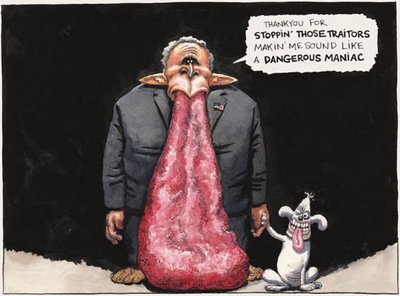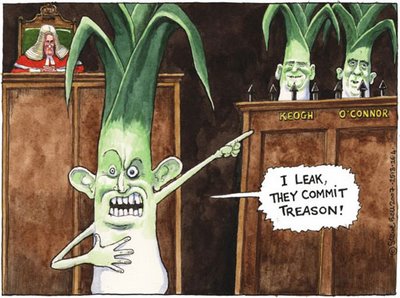Official secrets and not so official secrets.
It's great to see that Derek Pasquill has been cleared of breaching the draconian Official Secrets Act through his leaking of memos and documents to the Observer and New Statesman. It's thanks to Pasquill that we know just how clueless and mendacious the government was over extraordinary rendition, at turns not knowing how many flights had gone through our airspace while trying to "move the debate on" to get itself out of a sticky patch. The end result was the whitewash produced by the Intelligence and Security Committee, which altered the definitions of exactly what an "extraordinary rendition" was in order to clear MI5 of being involved in the kidnapping by the CIA of Jamil el-Banna and Bisher al-Rawi, both now back in Britain after being held at Guantanamo Bay.
Why he was ever considered for prosecution itself is a mystery. The Foreign Office quite openly admitted, despite the embarrassment especially over the rendition leaks, that his actions had not materially harmed it and had indeed changed policy for the better, especially over how the government now doesn't treat the Muslim Council of Britain as completely representative of British Muslims or the first port of call in a storm. It was this reluctant admittance by the prosecutors that some of the evidence they were to present in the case in actuality undermined their very argument that led to the prosecution being dropped.
Unlike some others that have quickly heralded this as a great victory for investigative journalism, as encouraging as it is, it doesn't alter the verdict in the far more pernicious prosecution last year of David Keogh and Leo O'Connor. They were the men who attempted to leak the al-Jazeera memo, where it's widely alleged that President Bush advocated the bombing of its headquarters in Qatar, and had to be talked down by Blair. If the public don't have a right to know when their leaders propose carrying out war crimes, ironically in this case in response to al-Jazeera's reporting of the US attack on the city of Fallujah, where alleged war crimes were taking place and where we know that weapons such as white phosphorus were used, then we might as well accept that the government of the day should be allowed to do whatever the hell it likes in secret, with no fear of whistleblowers exposing their actions. Both Nigel Sheinwald and the judge in his sentencing statement laughably claimed that the release of the memo could have "put lives at risk", when the only lives that were at risk were those of the al-Jazeera journalists doing their jobs.
The only real difference was that in the case of Keogh and O'Connor the officials who wanted the prosecution were prepared to testify, as was the prime minister's foreign policy advisor. With Pasquill, the embarrassment and vindictive nature of the trial was simply too much. It's also not the only trial upcoming under the OSA: Thomas Lund-Lack, who leaked a Joint Terrorism Analysis Centre report to the Sunday Times is also facing similar charges. The line between where investigative journalism and the public interest ends and justified government secrecy lies is an incredibly fine one, and it's not going to be decided through cases like this but through a review of the OSA itself, something that is long overdue.
Why he was ever considered for prosecution itself is a mystery. The Foreign Office quite openly admitted, despite the embarrassment especially over the rendition leaks, that his actions had not materially harmed it and had indeed changed policy for the better, especially over how the government now doesn't treat the Muslim Council of Britain as completely representative of British Muslims or the first port of call in a storm. It was this reluctant admittance by the prosecutors that some of the evidence they were to present in the case in actuality undermined their very argument that led to the prosecution being dropped.
Unlike some others that have quickly heralded this as a great victory for investigative journalism, as encouraging as it is, it doesn't alter the verdict in the far more pernicious prosecution last year of David Keogh and Leo O'Connor. They were the men who attempted to leak the al-Jazeera memo, where it's widely alleged that President Bush advocated the bombing of its headquarters in Qatar, and had to be talked down by Blair. If the public don't have a right to know when their leaders propose carrying out war crimes, ironically in this case in response to al-Jazeera's reporting of the US attack on the city of Fallujah, where alleged war crimes were taking place and where we know that weapons such as white phosphorus were used, then we might as well accept that the government of the day should be allowed to do whatever the hell it likes in secret, with no fear of whistleblowers exposing their actions. Both Nigel Sheinwald and the judge in his sentencing statement laughably claimed that the release of the memo could have "put lives at risk", when the only lives that were at risk were those of the al-Jazeera journalists doing their jobs.
The only real difference was that in the case of Keogh and O'Connor the officials who wanted the prosecution were prepared to testify, as was the prime minister's foreign policy advisor. With Pasquill, the embarrassment and vindictive nature of the trial was simply too much. It's also not the only trial upcoming under the OSA: Thomas Lund-Lack, who leaked a Joint Terrorism Analysis Centre report to the Sunday Times is also facing similar charges. The line between where investigative journalism and the public interest ends and justified government secrecy lies is an incredibly fine one, and it's not going to be decided through cases like this but through a review of the OSA itself, something that is long overdue.
Labels: al-Jazeera memo trial, Derek Pasquill, leaks, Official Secrets Act, Thomas Lund-Lack



